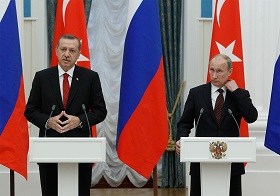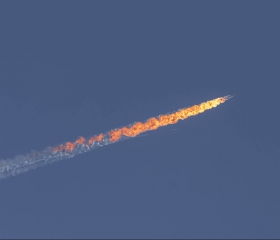It finally happened. November 24th, 2015 became a turning point for the Russian-Turkish relations. The two sides will probably never agree with each other on who is to blame for the SU-24 tragedy and on whether this was an unfortunate accident or a deliberately planned action. I would argue that the crisis between our two countries had been ripening for a long time, and the SU-24 grounding was only the last straw that broke the camel’s neck.
It finally happened. November 24th, 2015 became a turning point for the Russian-Turkish relations. The two sides will probably never agree with each other on who is to blame for the SU-24 tragedy and on whether this was an unfortunate accident or a deliberately planned action. However, at least one thing should be clear to everybody: a long optimistic chapter in the bilateral relationship is over, and we are entering a new, still very unclear and potentially very dangerous period. From now on, there’ll be no business as usual between Moscow and Ankara.
But how can we define this “business as usual”? If the Russian-Turkish cooperation was so great prior to November 24th, then why one single accident – no matter how dramatic and emotionally sensitive it might had been – turned out to be sufficient to negatively change the whole fabric of the Russian – Turkish partnerships in various fields – from trade to joint energy projects to University partnerships to humanitarian contacts?
I would argue that the crisis between our two countries had been ripening for a long time, and the SU-24 grounding was only the last straw that broke the camel’s neck.
For many years, Russians and Turks were trying to convince each other that they could “agree to disagree” on many controversial and explosive political matters. The hope was that the impressive dynamics of bilateral trade, investments, tourism, cultural exchanges, mixed marriages and so on would do the trick. Alas, it has not. The Russian – Turkish relations demonstrated a spectacular lack of the strategic depth – an evident deficit of the ability, courage and political will to look for and to find compromises and common denominators for the most fundamental problems pushing the two states apart from each other.
Over years serious disagreements over Caucasus, Middle East, Iran, Ukraine, NATO, BMD, gas pipelines and other matters were swept under the rug. But this mutual hypocrisy could not last forever. In a way, the ongoing crisis became possible only because the notion of a strategic partnership between Russia and Turkey had remained only on paper. Lacking the proper strategic depth, it did not pass a reality check and collapsed as a house of cards.
Still, though the strategic partnership had been mostly imaginary, the losses appeared to be more than real. Today Turkey arguably feels more pain than Russia does. Grounding the Russian aircraft has not helped to protect the Syrian Turkmen population close to the Turkish border; on the contrary, Turkmen opposition groups are more vulnerable now than they were ever before. If the idea was to enforce a no-fly zone over a part of the Syrian territory, it worked the other way round: today such a zone does exist, but under Russian control, backed up by a newly installed S-400 air defense system. Russian air attacks on trucks crossing the Syrian-Turkish border in both directions—on the basis that the traffic supports the so-called Islamic State – do not make things any easier for Ankara either.
Nonetheless, if any exalted politicians or opinion makers in Moscow believe that Russia can “punish” Turkey without a high price to pay, they are making a grave mistake. Ankara has many ways to make life harder for Moscow ranging from changing its energy import preferences to the Gulf to utilizing its influence over the numerous community of Crimean Tatar descendants in Turkey in ways detrimental to Russia’s interests. As for economic sanctions against Turkey, in the end of the day these sanctions are going to hurt both countries and it would make little sense arguing that the sanctions are more painful to Turks than to Russians.
What both sides could do to start restoring the relationship? Before answering this question, we should ask ourselves another one: what can we not afford in the near future? First, we cannot restore mutual trust anytime soon – this trust between the two national leaders and between the political elites in Moscow and Ankara is lost completely. Second, we cannot realistically discuss any strategic reconciliation between the two countries or a Russian-Turkish Grand Bargain – in the absence of mutual trust and with the deficit of the strategic depth the idea of a mutual remission of sins by Putin and Erdogan looks ridiculous. Third, we should be fully aware of the fact that the spiral of hostility and mutual animosity is spinning up, and it would take both sides a lot of energy and time stopping this negative momentum, not to mention reversing it.
Many proponents of better Russian-Turkish relations on both sides of the newly erected barricade argue that the only thing we can do now is to concentrate on non-state dimensions of the crippled relationship - trying to preserve and to expand human contacts, small business interaction, cultural links, joint NGO projects, education mobility, research partnerships and similar ‘uncontroversial’ forms of bilateral engagement. In my view, this is an important goal to pursue, but we should not overestimate our ability to set a firewall between state and non-state dimensions of the Russian-Turkish relations. In our two countries state traditionally exercises a lot of influence over public opinion, civil society, media, cultural and educational institutions. The odds are that it will be increasingly difficult to maintain even the most ‘innocent’ forms of no-state cooperation if both states do not demonstrate at least a benign neglect towards these activities. A Russian-Turkish rapprochement at the highest political level, albeit limited and incomplete, appears to be indispensable.
The solution is often should be searched for where the problem is. The most critical bone of contention between Russia and Turkey today – all other disagreements and disputes notwithstanding – is the future of Syria. Not so much the future of Bashar Assad, since it is clear that he will not run the country forever and his days may be numbered, but the future of the Syrian statehood itself. Russia is committed to preserving the territorial integrity of Syria, while Turkey feels responsible for the future of the Syrian Turkmen and other Turkey oriented groups opposed to Damascus. A number of external players including Iran and the Gulf states have their interests and their claims to protect particular factions of the Syrian population.
I do not like the term of ‘soft partition’ because it emphasizes the noun of ‘partition’ more than the ‘soft’ adjective. But a potential solution to the Syrian riddle might well be connected to the concept of an ‘asymmetrical federation’ that will not question the principle of the county’s territorial integrity, but will at the same time guarantee a sufficient autonomy for ethic, religious, regional and political factions in Syria, including the preservation of their traditional links with neighboring countries. The concept of an ‘asymmetrical federation’ may become the platform for a compromise not only between Russia and Turkey, but between all the major players involved in the Syrian conflict. If we agree on the future of Syria, it would be much easier to move ahead on other burning issues.
As for the longer term bilateral Russian – Turkish relations, a lot will depend on whether both sides can learn their lessons from the current crisis and whether the dialogue between Moscow and Ankara can gain a new strategic depth. My modest suggestion would be to set a high level second track channel of communications to compare long term interests, priorities, threats and challenges that the two counties are likely to be focused on beyond the time frameworks of their current political cycles. If we demonstrate due imagination and foresight capacities, we might be surprised to find out that our current disagreements and conflicts appear to be much less critical and irreconcilable if we look at them from a sufficient time distance.
The strategic depth must embrace both the past and the future. The past should not be forgotten in order to maintain our core identities and to learn from our mistakes. But it is the future that has to inspire individuals and nations. The best days of the Russian-Turkish relations may well be ahead of us, not behind us.
First published in Analist






